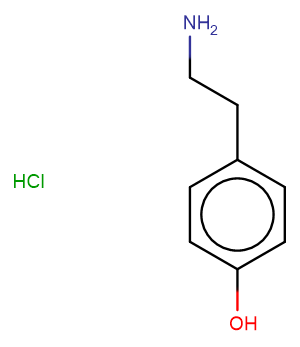
Tyramine hydrochloride
CAS No. 60-19-5
Tyramine hydrochloride( —— )
Catalog No. M21102 CAS No. 60-19-5
Tyramine hydrochloride is a biogenic trace amine that is generated via the decarboxylation of the amino acid tyrosine?exhibiting neuromodulatory properties as well as cardiovascular and immunological effects.
Purity : >98% (HPLC)
 COA
COA
 Datasheet
Datasheet
 HNMR
HNMR
 HPLC
HPLC
 MSDS
MSDS
 Handing Instructions
Handing Instructions
| Size | Price / USD | Stock | Quantity |
| 500MG | 52 | Get Quote |


|
| 1G | Get Quote | Get Quote |


|
Biological Information
-
Product NameTyramine hydrochloride
-
NoteResearch use only, not for human use.
-
Brief DescriptionTyramine hydrochloride is a biogenic trace amine that is generated via the decarboxylation of the amino acid tyrosine?exhibiting neuromodulatory properties as well as cardiovascular and immunological effects.
-
DescriptionTyramine hydrochloride is a biogenic trace amine that is generated via the decarboxylation of the amino acid tyrosine?exhibiting neuromodulatory properties as well as cardiovascular and immunological effects.
-
In VitroTyramine is normally broken down in your body by an enzyme called MAO (monoamine oxidase).
-
In Vivo——
-
Synonyms——
-
PathwayOthers
-
TargetOther Targets
-
RecptorOthers
-
Research Area——
-
Indication——
Chemical Information
-
CAS Number60-19-5
-
Formula Weight173.64
-
Molecular FormulaC8H12ClNO
-
Purity>98% (HPLC)
-
SolubilityIn Vitro:?DMSO : 100 mg/mL (575.90 mM)
-
SMILESCl.NCCc1ccc(O)cc1
-
Chemical Name4-Hydroxyphenethylammonium chloride
Shipping & Storage Information
-
Storage(-20℃)
-
ShippingWith Ice Pack
-
Stability≥ 2 years
Reference
1.Gaby Andersen Patrick et al. Food sources and biomolecular targets of tyramine.[J]. Nutrition Reviews 2018.
molnova catalog



related products
-
8-Epi-Loganic acid
8-Epi-Loganic acid Has antibacterial and antiviral effects.
-
Metastin (human)
Potent endogenous ligand of the kisspeptin receptor (KISS1, GPR54). Binds with high affinity to rat and human KISS1 receptors with Ki values of 1.80 and 1.45 nM respectively. Inhibits chemotaxis, invasion and metastasis of human melanomas and breast carcinomas. Stimulates gonadotropin secretion following i.c.v. administration.
-
ARDP0006
ARDP0006 is an inhibitor of NS2B-NS3 protease.



 Cart
Cart
 sales@molnova.com
sales@molnova.com


